NEW YORK—There’s no way to succinctly describe Tim Hetherington. You could call him a photojournalist, but that leaves out his work as a filmmaker. You could say he’s a writer, but that’s a narrow definition of his prowess as a storyteller using multimedia.
In a way, the London native who transplanted himself to New York is a perfect example of new trends in journalism. But don’t tell Hetherington that—he’s worked hard to not be put into a category.
“I like ideas,” says Mr. Hetherington. “I’m not interested in being relegated into the shoebox of photographers, into an art gallery, the way that photographers are taught to by mainstream discussion.”
He seems to be succeeding so far at being hard to pin down. Hetherington is a successful photogpraher-filmmaker with a new book “Long Story Bit by Bit: Liberia Retold.” He also has a feature-length documentary about a platoon of U.S. Airborne soldiers in Afghanistan due out in May next year that he made with his Vanity Fair colleague Sebastian Junger. He’ll also have an accompanying book of photographs that have barely been seen.
One photograph from his time in Afghanistan, of a weary soldier resting, already garnered him the 2007 World Press Photo of the Year.
Hetherington and Junger’s projects are the fruits of one year of going back and forth to Afghanistan, documenting the lives of the troops there. He says the documentary doesn’t have a political theme, though.
“It’s a story of loss of innocence—it’s a portrait of young men at war,” he says. “It’s also a commentary on the counter-insurgency war.”
His documentary and book are being eagerly anticipated, but Hetherington hasn’t let success go to his head. After 12 years of hard work in the field, he stays close to the basics.







